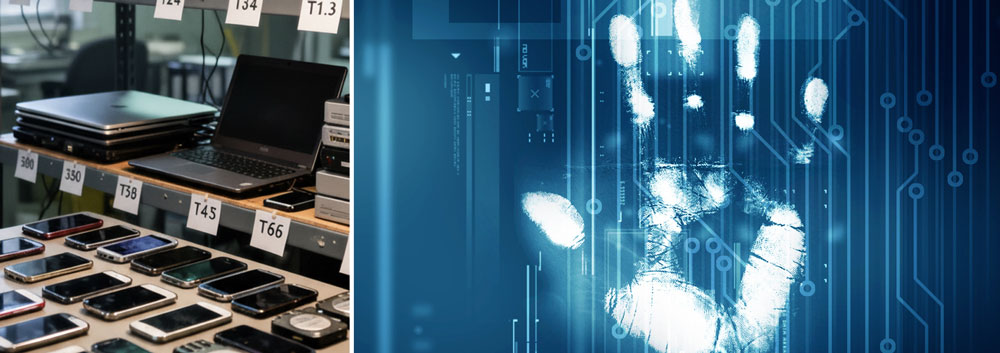University College 3 years Online Studies
Oslo Kristiansand
Education focusing on determining the who, what, where and when through the investigation of constantly changing, and increasingly complex digital environments. This study programme prepares you for a career within digital forensics and incident response, working for large organisations, cybersecurity companies and law enforcement agencies, who all have a need for specialists to investigate cyberattacks and cybercrime.
A High-Demand Field
Are you ready to dive into the fascinating realm of digital forensics and incident response? The Bachelor in Digital Forensics is tailored to equip you with the skills and knowledge needed to thrive in today's complex and rapidly evolving digital landscape. This comprehensive programme is designed to prepare you for a successful career investigating cybercrimes and cyberattacks, helping to secure digital assets as part of the teams who protect individuals and organizations from cyber threats.
Embrace the future of Digital Forensics and Incident Response: Digital forensics has come a long way from its traditional law enforcement roots. Today, it encompasses a dynamic approach fuelled by technological advancements, ever-changing usage patterns, and the recovery of vital evidence. Our world has become increasingly connected, with digital technology embedded in every aspect of our lives, from human bodies to the cloud.
As we rely more on digital technology, every device and platform potentially hold crucial clues to uncover the truth behind incidents – answering questions such as “who stole the data” or “who unleashed a malware”. The rise of cyber-attacks, ransomware, malware, and hacking has further amplified the need for skilled digital forensic experts.

It is a field with good job opportunities both now and in the future. Christoffer Hansen Michaelsen, student

There is always something to learn, and incredibly diverse job opportunities. Håkon Smalås, student
Embark on a transformative three-year journey: The three-year study programme delves into the art of analysing digital devices by honing your digital forensics and incident response skills. You will gain hands-on experience in securing, examining, and presenting evidence from digital devices, addressing a wide array of scenarios that you will come across in your future careers.
Take the first step towards an exciting career in digital forensics and incident response by applying to the Bachelor in Digital Forensics today! Unlock your potential and become an indispensable asset in the world of digital investigations.
Program Structure
Digital Forensics consists of 180 ECTS, combining general education and computer science fundamental courses, core digital forensics courses, and elective courses. The curriculum covers a wide range of topics, including computer and network security, operating systems, and digital evidence handling, analysis and presentation.
In your first year you will build a solid foundation in core technical fundamentals, setting the stage for success in the specialized courses further into the education. From the very beginning you will develop essential research and study skills, work as part of a vibrant student community, and collaborate on a project-based course to enrich your learning experience and forge lasting connections with your peers.
The second year takes you on a deep dive into the heart of digital forensics, exploring forensic methodologies and specialized courses. Learn the art of securing and analysing digital devices, data recovery, file reconstruction, and understanding the crucial aspects of an investigation. Benefit from the invaluable industry experience of our lecturers, who bring real-life examples and captivating stories to the classroom.
Your third year culminates in a Bachelor Project, allowing you to apply your newfound competence to innovative systems and applications. Under the expert guidance of our experienced staff, explore the area of digital forensics that fascinates you the most. Choose electives to gain additional expertise in advanced areas, preparing you to tackle the challenges of today and tomorrow.
Embrace the opportunity to become a digital forensics expert by joining the bachelor's degree. Set yourself on the path to an exceptional career, where your skills and passion will make a difference in the ever-evolving digital world.
Year 1: 60 ECTS
- Problem Based Learning and Research Methodologies (5 ECTS)
- Introduction to Programming (10 ECTS)
- Discrete Mathematics (10 ECTS)
- Programming and Databases (10 ECTS)
- Network Principles (10 ECTS)
- Introduction to Information Security (5 ECTS)
- Studio 1 (10 ECTS)
Year 2: 60 ECTS
- Operating Systems (10 ECTS)
- Digital Forensics (10 ECTS)
- Network Security (10 ECTS)
- Digital Investigation (10 ECTS)
- File System Analysis (10 ECTS)
- Studio 2 (10 ECTS)
Year 3: 60 ECTS
- Information Security Management (10 ECTS)
- Advanced Device Forensics (10 ECTS)
- Elective Courses (4 x 5 ECTS)
- Bachelor Project (20 ECTS)
Knowledge:
- To demonstrate knowledge of procedures and standards
- To demonstrate an in-depth knowledge of Information Security and the students chosen specialisation
- To be efficient, innovative, inquisitive security professionals
- To understand what constitutes a security professional
Skills:
- Interviewing skills and the ability to extract information
- Apply a range of problem solving and investigating techniques, and to be able to interpret the solutions appropriately
- Demonstrate at a practical level how to conduct forensic examinations of computer systems
- Appropriate handling techniques for digital evidence
- To be able to demonstrate excellent abstract analytical methods
- To have awareness of the greater implications of their decisions and actions
General Competence:
- Understand the importance of team-based, collaborative work
- Is socially and ethically appropriate and contextually sensitive
- Understand the skills required to be a security professional
- To understand the computing professional’s legal and ethical responsibilities
- To demonstrate good written & oral communication
- To possess good project management skills
- Apply a range of investigating and communication techniques, and to be able to appropriately interpret the solutions and communicate findings
- To demonstrate skills as a reflective practitioner, with the ability to critically reflect on practice in order to develop professional skills
As an online student you are required to purchase the required equipment and software. As a Campus student the required equipment and software is available for use.
Required Equipment
- A reliable internet connection
- Headphones or headset – with a microphone.
- Webcam.
- 2 USB Drives with 8-16 GB storage.
- PC/Laptop with the following specifications:
- Microsoft® Windows® 10 or 11.
- CPU: Intel i5 (64-bit Intel® or AMD® multi-core processor is recommended)
- GPU: Nvidia GeForce GTX (GeForce RTX 3070 is recommended)
- RAM: 16 GB (32 GB recommended)
- Storage: 500 GB (SSD/NVMe is highly recommended)
You must have full administrative privileges to install and manipulate all aspects of your computer. The minimum requirements apply to all who purchase/use their own machine. This may not be an Apple Mac, as these systems are not compatible with the required software.
Recommended Equipment
- 1-2 additional USB Drive with 1-4 GB storage
- 2 monitors, or 1 ultrawide screen
- 1 additional storage drive (Minimum 1 TB is recommended)
Required Software
As a student you will be provided student licences, until then you should explore the software.
Many students find that the use of Windows is a good starting point to allow them to develop the skills to configure alternative operating systems. Several tutorials will require access to a Windows operating system (either as a host or as a virtual machine).
Career Opportunities
The expertise and competence gained from this study programme is in high demand as the investigation of cyber incidents and digital systems continues to increase significantly across all sectors. The demand is driven by the expanding development and adoption of new technology in the race to exploit the digitalisation of commercial and domestic products and systems.
According to Abelia there is a worrying deficit of people with strong technology skills in Norway. The distance between needs and available expertise ranges from 24 to 113 percent. The best-case scenario suggests that by 2030, one in four ICT positions will be vacant.
Graduates of Digital Forensics are well-equipped to pursue rewarding careers in various sectors, including:
- Law enforcement and government agencies
- Private sector security and consulting firms
- Corporate IT and cybersecurity departments
- Cybercrime investigation and intelligence units
- Digital forensics research and academia
Are you ready to become a skilled digital forensics professional? Apply now for Bachelor in Digital Forensics and embark on an exciting and fulfilling career path. Contact the admissions team for more information on the application process, financial aid, and programme requirements.

Do you have questions about the program or your education choice in general? Register and get free study guidance.
Further Studies
Students who wish for further training in digital forensics can apply for studies related to computing and information security at the master level by Norwegian or international universities.
Watch recording of livestream
We recommend watching the latest livestream from the Computing bachelor’s degrees hosted by Emlyn Butterfield and recorded 10 March 2023. You can also skip directly to the chapter regarding Digital Forensics in the chapter menu, which starts at 10:51.




















